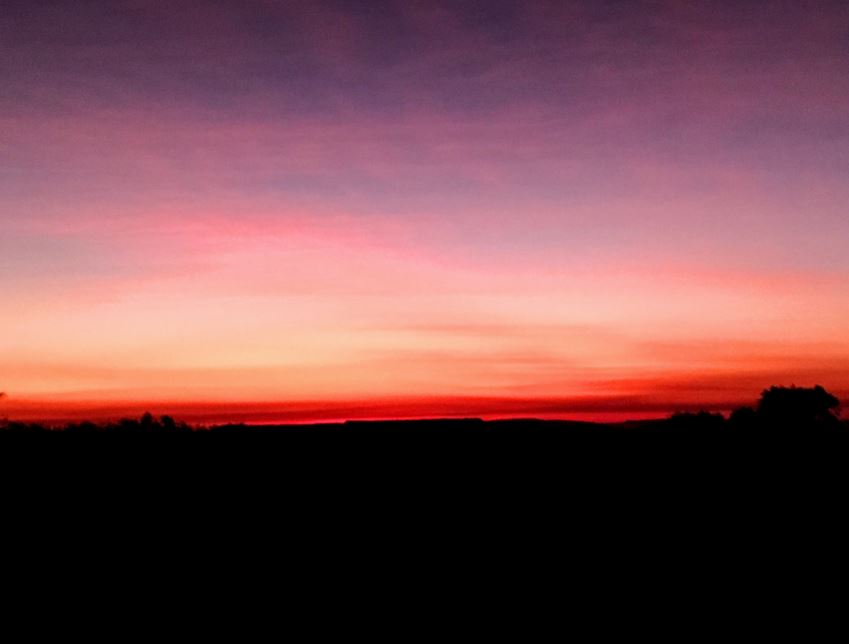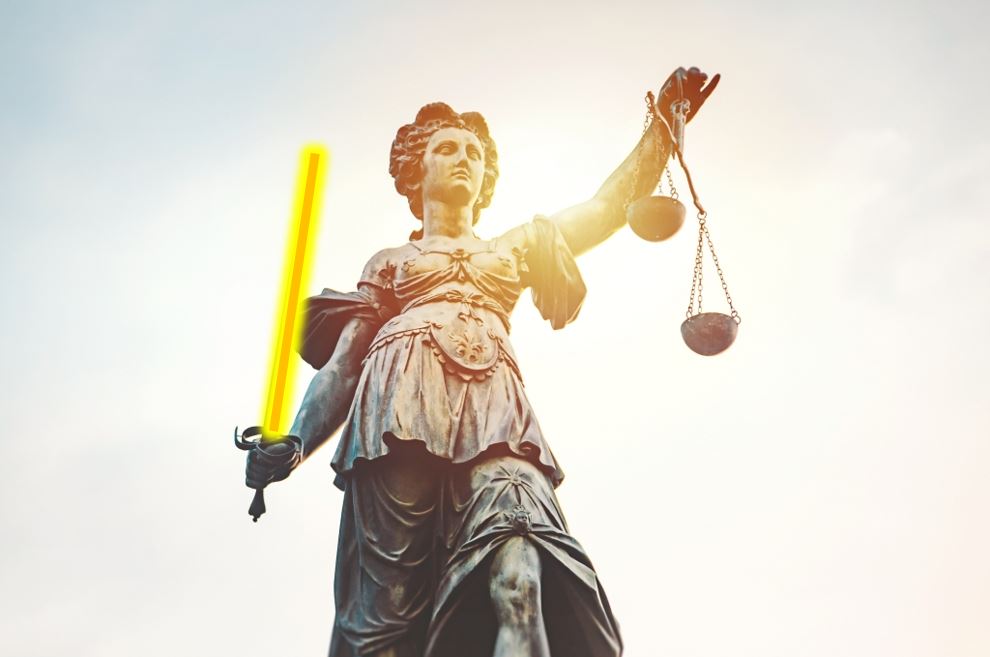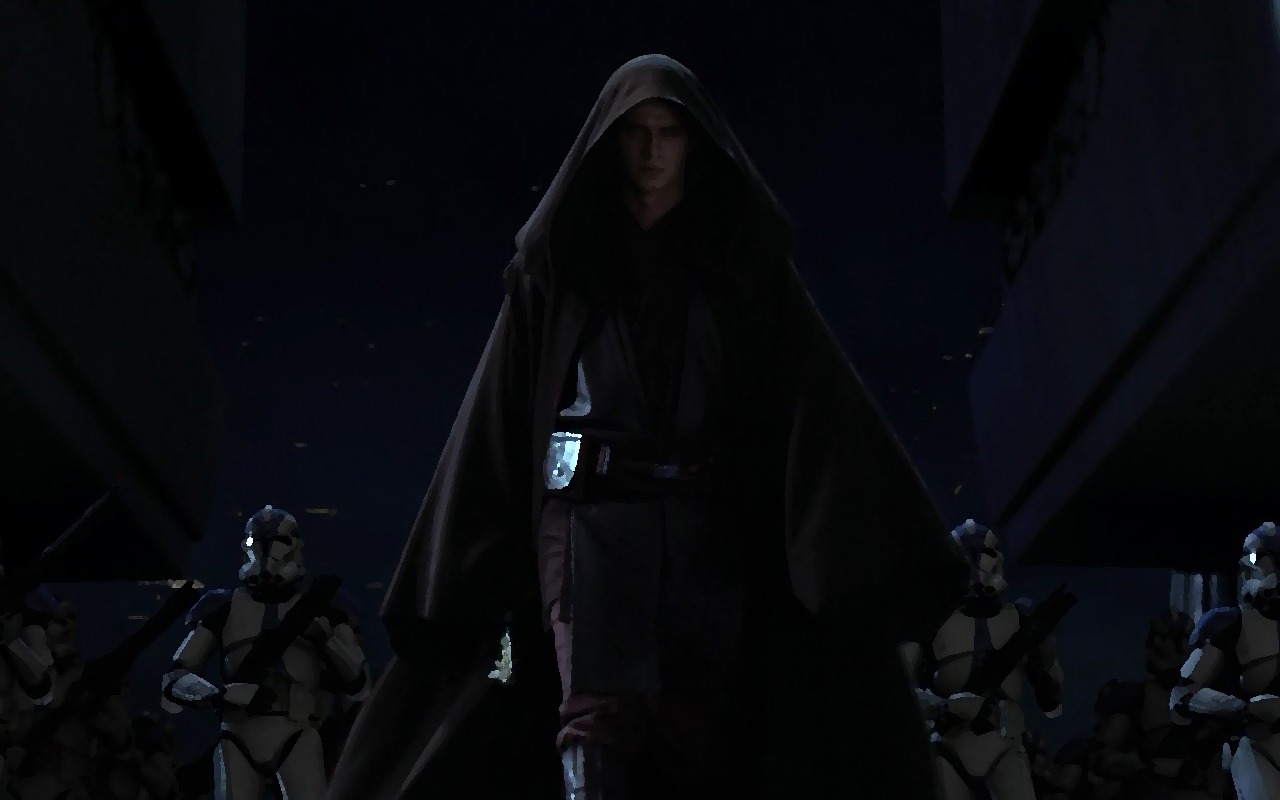
“He who faces himself, finds himself.” – The Clone Wars “The Gathering” Series 5 Episode 7
Ilum
In the Clone Wars (Series 5, Episode 7 “The Gathering” ) a group of Jedi Younglings are taken to a the planet of Ilum where they will complete a challenge called the Gathering. The Gathering is a rite of passage in the journey to becoming a Knight. The purpose of the challenge is to unite the young Jedi with the crystals that will form the heart of the light sabres they are expected to fashion on completion of the challenge. Each of the sacred Kyber crystals found within the protected Jedi caverns of Ilum amplify the Force and are tied spiritually to the essence of the Jedi it chooses to wield it. The Light Sabre becomes part of the Jedi as it contains their crystal and harnesses the energy of the Force. This is one of the reasons a personal light sabre is such an important part of a Jedi.
As the six Younglings arrived with Ahsoka Tano they are greeted by Yoda who explains the purpose of their mission. They are to enter the caves and each find the crystal which is matched to them. Yoda does not only want the young Jedi to find their crystals and fashion light sabres. The hidden purpose of The Gathering is to test each individual and push them to face and overcome their weaknesses by working as a team but ultimately each facing the ordeal alone. Like the cave on Dagobah where Luke was tested, the caves of Ilum can sense and manifest the fears and weaknesses of those that enter it. Each Jedi is being judged by his or her actions during the challenge. How they conduct themselves determines whether they pass or fail the test in the next step to becoming a Jedi Knight.
As the Youngling Jedi watched on, Yoda uses the Force to turn the ice wall in to water as the sun rises illuminating the cavernous chamber. The entrance to the Jedi cave opened Yoda warns the Younglings to use their skills and the Force to locate their Kyber Crystals. This they have to do as quickly as possible. As the sun begins to lower the ice wall will form over the entrance closing them in the cave for a full rotation of the planet. Facing their doubts and fears the Younglings enter in to the cave.
The March
Twenty of us were gathered in the early morning chill shivering in the dark. There was a hint of the sunrise on the horizon and birds had began to call in anticipation of a new day. The men around me spoke in hushed tones. There was a sense of anticipation, dread, fear and hope mixed with bravado. A few smoked last cigarettes and told jokes. Water was guzzled from canteens and a ration energy bar eaten hurriedly. Packs and weapons were propped up nearby having been checked and weighed by the instructors.
This was the final week of Basic Training. There had been thirty two at the start and now we were half of the original Platoon. Recruits had dropped off along the way from injury or failing tests and had been back squadded to Platoons farther back in training. A few had decided to leave the Army completely and requested to cancel their contracts and with some pulling teeth had been granted a dismissal. One had gone AWOL one night and had never returned. Three of the men in our final platoon had been back squadded from earlier platoons. One had been trying to reach graduation for almost a year.
Today was the last test of nearly six months of Basic Training. Over the last few days we had done route marches over 100km of terrain, completed physical fitness tests, completed navigation exercises, run obstacle courses and expended thousands of rounds of ammunition on the range. We had been tested on field craft, first aid, military history and tradition, weapons handling, basic infantry skills and radio communications. Today we had to speed march over 42 kilometers of trails and roads through farmland, heath and forest to a destination where we would be given our corps badges and welcomed in to the family.
We had less than 7 hours to do walk the distance carrying 40 pounds of kit and every one had to cross the finish line as a unit. It was explained that we were being assessed as a team and as individuals. We were to leave no man behind and carry or drag anyone that could not keep up or who fell aside. The pace was going to be brutal because the Officer leading the march was a fitness freak who did these just for the fun of it. Given that none of us had slept that night it was a tall order. It was emphasized, there would be no quitting.
A short safety brief done, the platoon sergeant ordered us to shoulder our packs. I groaned under the weight and cursed as I felt an item stick in to my kidney. Jumping up and down I managed to get it sitting comfortably. I knew within a few kilometers the straps of the pack and webbing would be cutting in to my shoulder stemming circulation. The pouches on my belt would rub at my hips and I’d be feeling heat sores and blisters forming on my feet and crotch. I had tapped up raw patches and was prepared physically and mentally. But I was still anxious and doubted myself.
Over the next few hours there would be nothing but the sound of feet stamping the ground and labored breathing. There would be the urging on by the instructors which would alternate between gentle pressure and frustrated yelling. I would be alone with my thoughts, my self-doubt and fears and would have to push through one pain barrier after the next. This was the final test and the key was to focus on the prize at the end. As light rose above the horizon we set off, silhouettes on the road. I settled in to the pace my eyes locked on the figure in front of me and I started to day dream.
The Crystal Hunt
During the hunt for crystals inside the Jedi Cave on Ilum, the young Jedi face their weaknesses one by one and overcome them individually but also as a group. Petro is selfish and impatient and in his haste to find a crystal almost fails the task and also abandons Katooni trapped behind in chamber behind an ice wall. It is only at the last moment that he becomes selfless and rescues Katooni. Petro then works through his task mindfully. He finds wins his crystal and frees himself from the cave. Katooni was at the beginning full of self doubt but her courage and determination sees her overcome her fears. Hesitant at first she scales a sheer rock face to claim her crystal and also finds her self confidence. When Petro abandons her she realizes her fate is sealed and accepts it with equanimity.
Meanwhile the Rodian, Ganodi is despondent in being unable to find a crystal. Her lack of Faith in the Force and her own ability leads her to search aimlessly. It is by finally being present in the moment and turning over the process to the Force that she is able to identify her crystal and claim it. Ganodi finds Faith and allows the crystal to find her.
Zatt, a Nautolian Youngling also seeks aimlessly and is distracted by technology during his search. Rather than using his intuition he was relying solely on a device to help him find his crystal. Zatt has failed to understand that technology may help but it does not complete missions alone or win wars. His senses and intuition cannot be replaced by a computer. It is only by destroying his personal computer that Zatt is able to open himself to the Force and find his crystal. By doing so Zatt finds his inner intuition and begins to sense with his feelings, not only his thoughts.
The Wookiee Gungi soon finds his crystal in the middle of a frozen subterranean lake partially bathed in sunlight. Attempting to cross the lake Gungi almost falls through the ice. It is apparent that he must wait for the sunlight to recede off the lake allowing it to freeze solid. The Wookie is impatient by nature and forces himself to settle in to meditation and resist the urge to act. As he waits the sunlight recedes from the lake and it freezes over. At last he is able to claim his crystal. Gungi also claims patience as his prize.
Byph, the Ithorian encounters his crystal guarded in a cavern that appears to burn with some malign presence. The Ithorian is terrified of monsters and must muster all of his courage to enter the chamber and take the crystal. When he does he realizes the imagery he had encountered was nothing but the product of his own fears. It was his imagination, the irrational fear of the dark. Failure is often the product of fear and fear is more often than not completely unjustified. The best way to overcome fear is to face it up close. The “monsters of our imagination” vanish in to thin air if we refuse to give them power through our mind. Byph does exactly that and also finds his courage.
The Last Mile
The platoon was now moving at a canter. My reverie had long been replaced with pain and mental anguish. Everything was burning. My lungs, legs and back begged for the pace to slow or stop. The last short rest break had been over an hour before and we were now pushing the pace to make up time. A soft rain drizzled down which was a blessing and a curse because it cooled down bodies but made everything wet and heavier. Everyone wheezed around me, coughed and spat as we labored forward. No one had fallen out yet. I knew from the road and passing country we were coming towards the end. We rounded a corner and there it was, two trucks and an ambulance about 400 meters ahead. The finish line! Hearts soared and a cheer went up from the platoon. We sped up in to a run.
We drew closer and the vehicles suddenly roared in to life and drove away disappearing in a cloud of smoke. I stared in disbelief and horror. Someone groaned and swore loudly. Everyone’s hopes were dashed. I wanted to fall to the side and collapse in to a road side drain and cry like a baby. One of the instructor yelled at us “keep Effin moving, this is it, this is why you have been working!”. Soon enough the vehicles reappeared further down the road and we ran up to them gasping for air. Our Platoon leader directed us to drop our packs and form up. We had finished and passed the test.
The Tally
In the space of 6 hours and 20 minutes to complete the march every emotion had swept over my consciousness. I felt as if I had to grapple with every dark and negative thought that visited to keep putting one foot in front of the other. My mind tormented me constantly, egging me to quit. During moments that seemed like hours I hated myself and the men around me and wanted to be anywhere else but there. Self pity filled my senses and I wallowed in the mud of a personal misery. Someone started to falter and fell behind and the instructors fell on him like hyenas, yelling and cursing him to move it as he begged that he couldn’t go on. My heart filled with rage and hate as we were halted, did a 180 degree turn and ran back to him so he could find his place back in the pack before we turned around and resumed the march. Fantasies started to fill my mind, some pleasant and others terrifying and disturbing. My mind screamed through the pain. We were barely at the 20 kilometer mark.
As the march progressed past that half way mark and we came closer to the finish line the mental burden started to ease a bit and I started to get numb to the pain. The time we were making was encouraging and everyone was keeping up the brutal pace. As the mental fog started to lift a ray of sunshine started to filter through. I felt renewed confidence and self belief. Doubt and self pity was replaced with a sense of hope, courage and determination. “I can do this” I thought. We started to encourage each other and those that were suffering more than others. With words of encouragement came a renewed drive to push through the mental and physical barriers of the march. We were working as a cohesive team that cared for each other and wanted each other to succeed.
The Will to Succeed
All of the Younglings had made it outside of the Cave except Petro and Katooni. The four Younglings wanted to re-enter the cave but Yoda told them to not to move. There is a time to act and this was not one of them. The Younglings in the cave had to face their peril alone as Jedi often must. Katooni appeared as the ice wall was closing and manages to slip through with inches to spare. Petro was not with her. By rescuing Katooni, Petro had lost precious seconds and was now trapped behind by the ice wall. The cave entrance was sealed. The Younglings stared at the wall in realization of the loss of their friend who would certainly freeze to death in the cave. Yoda and Ahsoka did not seem concerned. A moment later, Petro smashes his way through the ice wall and presents his crystal to Yoda. The ice wall could be broken. It was only impenetrable if the mind allowed it to be.
After the March and back in Barracks, one of the Instructors said that the final march was a mental challenge more than a physical one. The march was intended to test character as much as fitness and force each recruit to face their weaknesses and overcome them. They had no doubt that after six months of training most of us were fit enough to have been able to turn around and march back to the start line if we had been ordered to do so. That was our job. In war time under horrific conditions, wounded and exhausted soldiers are force marched over far worse terrain for days, not hours.
The Sergeant revealed that Recruits did not quit because they physically could not handle training, they quit because they lost the mental game. They quit because they built walls in their minds and sabotaged themselves along the way with self defeating talk and attitudes. The vehicles had been parked a kilometer short of the finish line on purpose. They had been instructed to move on as we approached. The reason for this was simple, a person’s character is revealed when you give them hope and then snatch it away. Spirits that were soaring had now hit rock bottom. This is the moment when most will give up and quit, at the very end of the road. The Sergeant asked us all; “What were you going to do? Keeping going or lay down and die?”. The Instructors wanted to know if they were sending Lambs or Lions to a unit that could go to war.
No Limits
The limits we imagine that we have only exist in our mind. We are actually capable of far more than we give ourselves credit for. Most of the time we are only fighting ourselves and the internal dialogue that says “I can’t do it”, “I’m not good enough” and “This is too hard”. Like the ice wall in the Jedi cave our obstacles only appear impenetrable because we convince ourselves that they are. We can smash through the barriers that we think block our way. The march was a final test because it revealed to the Instructors and to each recruit their true nature. It tested the mental, emotional and physical boundaries and exposed weaknesses within the individual. Over a few hours we learned more about ourselves than most of us had in our short lives.
“Easy to break (the wall) if you have the will” – Yoda (The Gathering)
The end of Basic Training was not the end but only the beginning of our journey. Each of us graduated and went on to our units where we faced greater challenges as individuals but also in our teams. Likewise the Gathering on Ilum ultimately led the Youngling Jedi to further trials on their journey to Knighthood. As Jedi each of the Younglings would grow and face their own challenges. The ordeal in the caves of Ilum was but the first. Each Jedi proved they could go past their self imposed limits.
The Gathering
My Platoon was also a Gathering of young men who wanted to be warriors and do greater things. We all wanted to test ourselves. Together we faced a challenge that most would find daunting if not impossible. For many of us it was the hardest and most important challenge we had ever faced. By digging deep and finding the power within we found the key to success. As individuals we fought our own internal battles during the march but we made sure that everyone of us got over the finish line and we finished as one. We each won the coveted brevet, our own personal Kyber crystal.
The Jedi Path is a journey in spiritual, mental and physical development and growth. The challenges are increased in intensity and difficulty with one level to the next in order to push the Jedi to the limits of their capability. The intent is not to break the Jedi or push them to quit but to show the Jedi what they can do if they have confidence in themselves and in their training. Fantasy often reflects reality in many ways. The march, the Army and the decades of stumbling through life and my eventual recovery from alcoholism has taught me that life is a similar journey. Along the way we face challenges some hard and some seemingly impossible. Somehow we find a way and even failure carries lessons that we can use. Every day is an opportunity to learn and practice the values we hold dear and the virtues that we value.
The virtues which Yoda offered to the Younglings in the “The Gathering” are the same virtues I aspired to in the Army. They were the values that our Instructors tried to drum in to us during Training and the fuel which got us over the line during the final march. The virtues of patience, quiet determination, fearlessness, confidence, courage, faith, humility, team work, responsibility and selflessness won the Jedi their crystals. These same virtues can help us daily meet our own personal challenges in life if we embrace them. We also recognize that most of the barriers and walls we encounter are only in our minds. We can chose to breakthrough them if we really want to.





